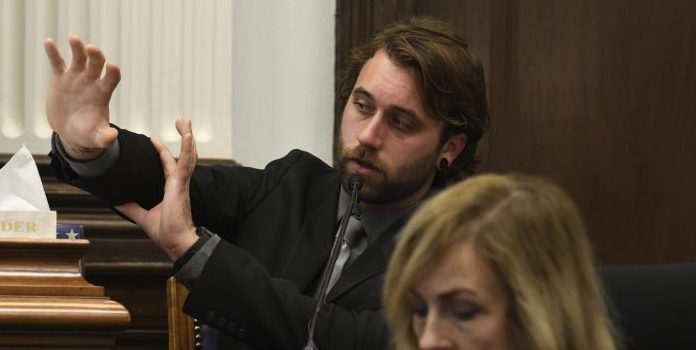(Headline USA) The rioter who survived after Kyle Rittenhouse shot him on the streets of Kenosha testified that he pointed his own gun at Rittenhouse but didn’t mean to and claimed he had no intention of firing it.
Gaige Grosskreutz, the third and final man shot by Rittenhouse during a night of violent Antifa-led race riots in the summer of 2020, took the stand Monday at Rittenhouse’s murder trial and recounted how he drew his own pistol after the bloodshed started.
“I thought the defendant was an active shooter,” said Grosskreutz, 27. Asked what was going through his mind as he got closer to the 17-year-old Rittenhouse, he said, “That I was going to die.”
Rittenhouse shot Grosskreutz in the arm, tearing away much of his bicep—or “vaporized” it, as the witness put it.
Rittenhouse, now 18, is on trial on charges of killing the two other men and wounding Grosskreutz.
The one-time police youth cadet from Antioch, Illinois, had gone to Kenosha with an AR-style semi-automatic rifle and a medical kit in an effort to safeguard property from the violent demonstrations that broke out over the shooting of Jacob Blake. Blake, a domestic abuser, was shot and paralyzed by police days earlier while lunging for a knife.
With the prosecution’s case expected to rest soon, efforts to Rittenhouse as the instigator of the bloodshed have been butchered by several sloppy errors so far, with witnesses undermining the narrative on key facts.
That was the case again on Tuesday, when Grosskreutz admitted that he had been aiming his weapon before he himself was shot.
Under questioning from the prosecution, he said he had his hands raised as he closed in on Rittenhouse and didn’t intend to shoot him. Prosecutor Thomas Binger asked Grosskreutz why he didn’t shoot first.
“That’s not the kind of person that I am. That’s not why I was out there,” he said. “It’s not who I am. And definitely not somebody I would want to become.”
But during cross-examination, Rittenhouse defense attorney Corey Chirafisi asked: “It wasn’t until you pointed your gun at him, advanced on him … that he fired, right?”
“Correct,” Grosskreutz replied. The defense also presented a photo showing Grosskreutz pointing the gun at Rittenhouse, who was on the ground with his rifle pointed up at Grosskreutz.
Grosskreutz, under follow-up questioning from the prosecutor, said he did not intend to point his weapon at Rittenhouse.
Wisconsin’s self-defense law allows someone to use deadly force only if “necessary to prevent imminent death or great bodily harm.”
The jury must decide whether Rittenhouse believed he was in such peril and whether that belief was reasonable under the circumstances.
Grosskreutz claimed he had gone to the protest in Kenosha to serve as a medic, wearing a hat that said “paramedic” and carrying medical supplies, in addition to a loaded pistol.
Such guerilla warfare is a common modus operandi for Antifa. Many have been reported to show up at riots claiming to be members of the media.
Grosskreutz admitted his permit to carry a concealed weapon had expired and he did not have a valid one that night but that he regularly violated it while attending leftist riots and protests.
“I believe in the Second Amendment. I’m for people’s right to carry and bear arms,” he said, explaining why he was armed. “And that night was no different than any other day. It’s keys, phone, wallet, gun.”
While Grosskreutz claimed he never verbally threatened Rittenhouse, Chirafisi—the defense attorney—said that people don’t have to use words to threaten others. They can do so by their actions, “like running after them down the street with a loaded firearm,” Chirafisi said. Grosskreutz denied he was chasing Rittenhouse.
Chirafisi also said Grosskreutz lied when he initially told multiple police officers that he dropped his weapon.
In addition, Chirafisi pointed to Grosskreutz’s lawsuit against the city of Kenosha, in which he alleges police enabled the violence by allowing an armed militia to have the run of the streets during the demonstration.
“If Mr. Rittenhouse is convicted, your chance of getting 10 million bucks is better, right?” Chirafisi said.
Chirafisi also asked Grosskreutz if he told his former roommate that his only regret was “not killing the kid and hesitating to pull the gun before emptying the entire mag into him.” Grosskreutz denied saying that.
Grosskreutz, who was trained as a paramedic, testified that he volunteered as a medic at protests in Milwaukee in the days after George Floyd died in May 2020. Grosskreutz said he attended around 75 protests before the night he was shot.
Last week, witnesses at the trial testified that the first man shot and killed, Joseph Rosenbaum, 36, was “hyperaggressive” and “acting belligerently” that night and threatened to kill Rittenhouse at one point.
One witness said Rosenbaum was gunned down after he chased Rittenhouse and lunged for the young man’s rifle.
Rosenbaum’s killing set in motion the bloodshed that followed moments later: Rittenhouse killed Anthony Huber, a 26-year-old protester seen on bystander video hitting Rittenhouse with a skateboard. Rittenhouse then wounded Grosskreutz.
Adapted from reporting by the Associated Press

